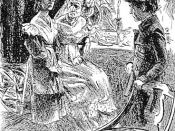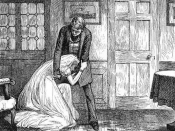Charles Dickens' novel, Great Expectations is the story of a village orphan named
Pip, who struggles throughout the novel to find his place in society. Dickens explores the
theme of guilt in the narrative by means of the main character Pip. Dickens strikes the
reader , however, with the various forms of guilt throughout his life. Each stage of Pip's
life represents a different stage of guilt and an evolution of his morals. During his
childhood, Pip experiences the guilt of conscience when he helps a convict. As he
becomes an adolescent he feels guilty for being poor (also linked to his guilt of being
rejected by Estella for being poor) and for once being ashamed of his loved
ones. Through Pip, Dickens explores the meaning of morality through Pip's guilt and
social advancement. This idea is also shared in a critical literature survey:
What strikes one most powerfully about this compact and
streamline narrative- technically, perhaps Dickens' best-is
the excessive and apparently unmotivated guilt of its hero.
The author, Dickens, shows the change of Pip's view of crime within his encounters with
the justice system and the characters Magwitch. The image of crime and criminal justice
pervades the book, becoming an important symbol of Pip's inner struggle, as a young
child, to resolve his own inner moral conscience; whether criminals are right in their
actions or the justice system is wrong in its actions. Just as social class becomes an
outward standard of value that Pip must learn to look beyond in finding a better way to
live his life, the external trappings of the criminal justice system (police, courts, jails,
etc.) become an exterior standard of morality that he has to look beyond to trust his
inner conscience. Magwitch, for instance, frightens Pip at first simply because he...


